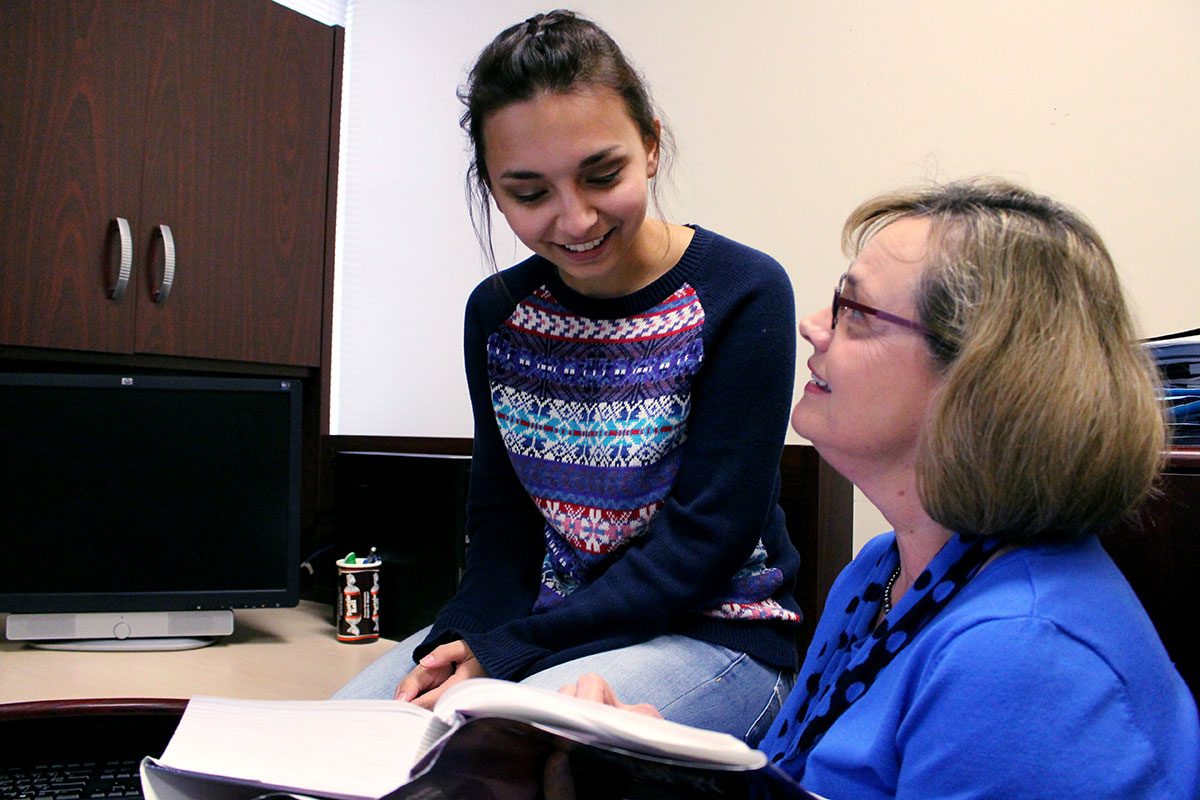
Rachel Mangiacotti (left) organized and evaluated an ‘experiential workshop’ about Canada’s history and was mentored by Donna Martin. // Photo by Kaitlin Vitt
Gaining confidence through education
When Donna Martin, an associate professor at the U of M’s College of Nursing, had her first clinical day 40 years ago as a 19-year-old nursing student, she couldn’t go into the patient’s room. She was too shy.
Instead she stayed out in the hallway, going into the room only at the end of the day with her instructor who completed the patient’s care.
“I thought they were going to kick me out,” Martin says about the university.
Years later, when Martin was 26, her shyness had a turning point — something inside her changed.
She was diagnosed with thyroid cancer. The thyroid gland is near the voice box.
“I really felt like it made me aware that I need to really use my voice more to advocate for my patients,” she says.
Martin recovered from cancer. Finding her voice influenced her future endeavours in teaching.
Bridging past and present
Through Experience Research, this summer Martin mentored Rachel Mangiacotti, a third-year nursing student. Experience Research is the undergraduate research award offered by the office of the vice-president (research and international).
Similar to Martin, Mangiacotti gained confidence through her education. She says being a part of a research team and learning new skills has helped her “come out of her shell.”
Martin’s work focuses on health equity in Indigenous communities. As part of her research award, Mangiacotti, 20, helped organize, implement and evaluate five half-day “experiential workshops” on Canada’s history, with a focus on Indigenous peoples and their cultures.
Martin got the idea from a conference that nursing students attended last year in B.C. They participated in Building Bridges Through Understanding the Village, a workshop developed by Kathi Camilleri, who has a master’s degree in leadership studies and identifies as Cree, Métis and Irish.
The workshop guides participants through Canada’s history, including colonization and people’s experiences in Residential Schools.
Martin wanted to bring Camilleri to Winnipeg to guide the workshop since it was so well received among the students who attended in B.C.
“They really felt very strongly as a health-care professional, when caring for an Indigenous patients’ family or community, you need to understand the history so you can provide culturally safe care and really understand what’s behind us so we can move forward to reconciliation,” Martin says.
Mangiacotti attended the first workshop, which had about 100 participants. More than 200 people, mainly nursing students, participated over the five workshops.
During the workshops, people form a “village” and gather in circles surrounding each other, representing, children, parents, Elders and those who protect the village, like hunters and gatherers.
Camilleri leads the workshop and wears a red hat, taking the role of the colonizer. But Mangiacotti says Camilleri didn’t say what country or background she was from.
“It definitely brought a new perspective,” Mangiacotti says. “It solidified everything we had been taught in previous courses, but she had a very non-blameful outlook.”
Martin says the workshop also had students “looking into the future” at ways they can work with Indigenous and non-Indigenous peoples, as a director of a hospital or a manager of a unit, for example.
“You’re the leader,” she says. “What kind of values are you going to bring to your organization?”
“How will you take off your red hat?” Mangiacotti adds.
Finding a positive path forward
During the evaluation stage, students told Mangiacotti that unlike other presentations, in Camilleri’s workshop they didn’t feel like they were being blamed for Canada’s history. She says instead the students recognized that as healthcare providers, they need to step up to provide improved care for everyone by approaching people in a non-judgemental way and providing patient-centred care.
“You can’t just go in there and say, ‘I’m a nurse. I know what I’m talking about, and this is what you need to do.’ That’s not going to work,” Martin says. “You have to acknowledge that there’s value in that traditional Indigenous knowledge.”
Martin and Mangiacotti are not Indigenous, but they had guidance from people who are. Martin says it’s important to include and respect Indigenous people’s perspectives when working on projects like hers.
Conducting research showed Mangiacotti a different side of nursing, she says. Instead of looking at only acute and chronic illnesses, she also studied public health and community issues.
She says she thinks students gain experience in a professional setting by doing research, since they will work with others on a team.
Eye-opening experience
Mangiacotti also helped with the planning of a youth gathering in Little Saskatchewan First Nation, a community in the Interlake affected by the flood in 2011. She met with Elders and chief and council. She visited the community and saw how water flooded and destroyed the land, which she calls an eye-opening experience.
The youth gathering, set for January 2017, is intended to be a place people can talk about how the flood affected their lives and what kind of ideas they have to move forward.
Mangiacotti learned about the awards at a presentation, and she talked with a student who had worked with Martin. After that, she was convinced to apply for an award and says she may apply again. The awards application deadline is Feb. 15.
Before receiving the award, Mangiacotti says she didn’t think about doing research, but now she’s considering a master’s degree — to Martin’s delight, who smiles and claps as Mangiacotti says this.
Mangiacotti has continued doing research and is now working on a project focused on breastfeeding experiences of low-income women in Winnipeg.






